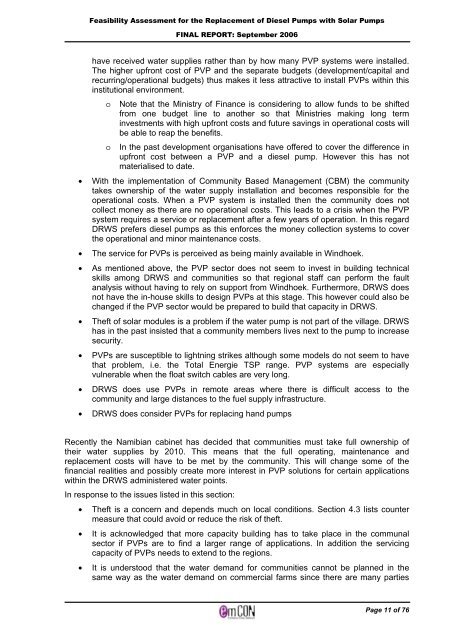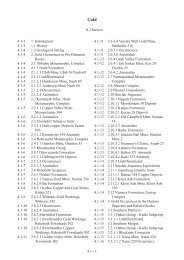Solar PV water pumping study - FINAL REPORT ... - UNDP, Namibia
Solar PV water pumping study - FINAL REPORT ... - UNDP, Namibia
Solar PV water pumping study - FINAL REPORT ... - UNDP, Namibia
Create successful ePaper yourself
Turn your PDF publications into a flip-book with our unique Google optimized e-Paper software.
Feasibility Assessment for the Replacement of Diesel Pumps with <strong>Solar</strong> Pumps<br />
<strong>FINAL</strong> <strong>REPORT</strong>: September 2006<br />
have received <strong>water</strong> supplies rather than by how many <strong>PV</strong>P systems were installed.<br />
The higher upfront cost of <strong>PV</strong>P and the separate budgets (development/capital and<br />
recurring/operational budgets) thus makes it less attractive to install <strong>PV</strong>Ps within this<br />
institutional environment.<br />
o Note that the Ministry of Finance is considering to allow funds to be shifted<br />
from one budget line to another so that Ministries making long term<br />
investments with high upfront costs and future savings in operational costs will<br />
be able to reap the benefits.<br />
o In the past development organisations have offered to cover the difference in<br />
upfront cost between a <strong>PV</strong>P and a diesel pump. However this has not<br />
materialised to date.<br />
• With the implementation of Community Based Management (CBM) the community<br />
takes ownership of the <strong>water</strong> supply installation and becomes responsible for the<br />
operational costs. When a <strong>PV</strong>P system is installed then the community does not<br />
collect money as there are no operational costs. This leads to a crisis when the <strong>PV</strong>P<br />
system requires a service or replacement after a few years of operation. In this regard<br />
DRWS prefers diesel pumps as this enforces the money collection systems to cover<br />
the operational and minor maintenance costs.<br />
• The service for <strong>PV</strong>Ps is perceived as being mainly available in Windhoek.<br />
• As mentioned above, the <strong>PV</strong>P sector does not seem to invest in building technical<br />
skills among DRWS and communities so that regional staff can perform the fault<br />
analysis without having to rely on support from Windhoek. Furthermore, DRWS does<br />
not have the in-house skills to design <strong>PV</strong>Ps at this stage. This however could also be<br />
changed if the <strong>PV</strong>P sector would be prepared to build that capacity in DRWS.<br />
• Theft of solar modules is a problem if the <strong>water</strong> pump is not part of the village. DRWS<br />
has in the past insisted that a community members lives next to the pump to increase<br />
security.<br />
• <strong>PV</strong>Ps are susceptible to lightning strikes although some models do not seem to have<br />
that problem, i.e. the Total Energie TSP range. <strong>PV</strong>P systems are especially<br />
vulnerable when the float switch cables are very long.<br />
• DRWS does use <strong>PV</strong>Ps in remote areas where there is difficult access to the<br />
community and large distances to the fuel supply infrastructure.<br />
• DRWS does consider <strong>PV</strong>Ps for replacing hand pumps<br />
Recently the <strong>Namibia</strong>n cabinet has decided that communities must take full ownership of<br />
their <strong>water</strong> supplies by 2010. This means that the full operating, maintenance and<br />
replacement costs will have to be met by the community. This will change some of the<br />
financial realities and possibly create more interest in <strong>PV</strong>P solutions for certain applications<br />
within the DRWS administered <strong>water</strong> points.<br />
In response to the issues listed in this section:<br />
• Theft is a concern and depends much on local conditions. Section 4.3 lists counter<br />
measure that could avoid or reduce the risk of theft.<br />
• It is acknowledged that more capacity building has to take place in the communal<br />
sector if <strong>PV</strong>Ps are to find a larger range of applications. In addition the servicing<br />
capacity of <strong>PV</strong>Ps needs to extend to the regions.<br />
• It is understood that the <strong>water</strong> demand for communities cannot be planned in the<br />
same way as the <strong>water</strong> demand on commercial farms since there are many parties<br />
Page 11 of 76




